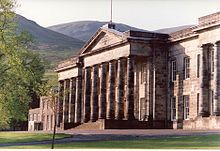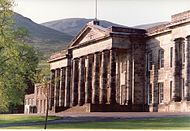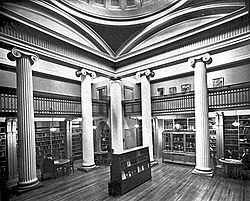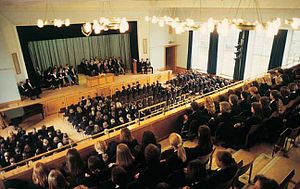- Dollar Academy
-
Dollar Academy Motto Juventutis Veho Fortunas
(Latin: "I bear the fortunes of youth")Established 1818 Type Independent Day and Boarding School Rector David Knapman Chairman of Governors John Cameron of Balbuthie CBE Founder Captain John McNabb Location Academy Place
Dollar
Clackmannanshire
FK14 7DU
ScotlandStudents c. 1250 Gender Coeducational Ages 5–18 Houses Atholl
Mar
Stewart
ArgyllColours Navy Blue & White Publication Fortunas (biannual publication) School newspaper The Galley Former pupils Old Academicals Website www.dollaracademy.org Coordinates: 56°09′58″N 3°40′14″W / 56.166225°N 3.67059°W
Dollar Academy was founded in 1818, which makes it the oldest co-educational day and boarding school in the world. The open campus occupies a 70-acre (280,000 m2)site in the centre of the thriving town of Dollar in Central Scotland, less than 40 minutes drive from the two main Scottish cities, Glasgow and Edinburgh. The school is located at the foot of the Ochil hills and surrounded by Clackmannanshire countryside.
While it has a reputation as one of the sportiest schools in Britain,[1] Dollar Academy is, according to The Scotsman,[2] Scotland's best-performing school academically. The 2011 SQA exam results saw a 95% pass rate at Higher, 62% of which were at grade A. An impressive 38 students achieved a clean sweep of five or more Highers at grade A. Dollar Academy has also outstanding art and music facilities, with several large scale public performances and exhibitions each year, including a Christmas concert staged at the Usher Hall, Edinburgh.
Dollar Academy students have a reputation for success in University entry in medicine, law, engineering and business studies. Over 40% of leavers each year go on to study one of these subjects, usually at Scottish Universities such as St Andrews and Edinburgh, but also at leading English Universities such as Oxford and Cambridge.Contents
Overview
There are over 1250 students at Dollar Academy, making it the fourth largest independent school in Scotland. All based on a single campus, it is divided into three separate schools: the Prep School (Preps I to V for ages 5–10), the Junior School (Juniors I and II for ages 10–12) and the Senior School (Forms I to VI for ages 12 going on 18).
Around 100 of the students are boarders; the rest are day pupils, either from the village of Dollar itself or from the surrounding counties of Clackmannanshire, Stirlingshire, Perth and Kinross and Fife. Just 20% of the boarding students are from overseas, representing less than 4% of the total school roll. Foreign students come from a range of countries, including France, Spain, Germany, Russia, and China. The remaining 80% of boarding students are UK nationals.Dollar Academy has a wide range of activities on offer; there are over 70 sports and recreational activities which occupy students after the school day has finished and over the weekend. Dollar Academy has produced international competitors across many disciplines, most notably in Rugby and Shooting, but the emphasis is on taking part, with students continually challenged to try new and unusual activities.
Academic
Dollar Academy follows the Scottish education system, with students sitting a mixture of Standard Grades and Intermediates at the end of Form IV and Highers at the end of Form V/VI. Most courses in Form VI are at Advanced Higher level. A number of students study the Scottish Baccalaureate. All standard subjects are on offer at Dollar Academy. The school also teaches Classical Studies, Latin and Greek, ITC training is provided to all students, and music, art and drama is mandatory.
Specialised courses and industry placements are available to senior students who wish to study medicine, law, engineering and business. The teacher:student ratio at Dollar Academy is 9:1 and support is provided across all subjects. In 2011, the national pass rate for Scottish Higher exams was 75.2% ref: SQA. The Dollar Academy pass rate was 95%, with 62% of passes at grade A. The Governors' Bursary of £500 is awarded to those students who attain 5 As at band 1 in their Highers.
Extra curricular
The school has a well-known pipe band, which has won the Scottish Schools CCF Pipes and Drums competition every year since 2000.[3].
Dollar Academy's CCF (Combined Cadet Force) is also very strong, having won the Scottish Schools' military skills competition for the last three years. The school was also the first Scottish school to win the Ashburton Shield at Bisley.
The School Day
The school day begins at 8:45 am, when pupils must be in Registration in their Form Tutor Groups to be registered at the beginning of each day. In each year there are around 8 or 9 such classes, each of about 17–20 pupils. On Mondays, Wednesdays and Fridays pupils attend Morning Assembly from 9:00 am to 9:15 am. This consists of an academic parade, a hymn, a bible reading and a prayer, followed by announcements about the forthcoming days. On Tuesdays and Thursdays there is extended registration which lasts until 9:10 am, with classes starting five minutes earlier than usual.
There are five periods in the day, each lasting one hour. First period begins at 9:15 am and finishes and 10:15 am, and is followed by second period which ends at 11:15 am. Between 11:15 am and 11:30 am is morning break (there is extended break on a Friday lasting an extra five minutes). Third period is from 11:30 am to 12:30 am, and is followed by lunch, which finishes at 1:25 pm. Fourth and fifth period follow, ending at 3:25 pm. Buses leave Dollar at 3:35 pm. After-school activities usually take place between 3:30 pm and 4:45 pm. 'Late buses' leave Dollar at 5:15 pm.
History
Dollar was founded in 1818 at the bequest of John McNab or McNabb, a merchant who bequeathed part of his fortune - £65,000 - to provide "a charity or school for the poor of the parish of Dollar where I was born".[4]
McNabb died in 1802 but it took another sixteen years before the school opened it doors after much debate about how to use the bequest. It was in 1815 that the Rev. Andrew Mylne, Minister of Dollar, along with fellow Trustees conceived of a great academy to educate the boys and girls of the parish, and also pupils from outside Dollar, who would board with teachers. Full fees would be charged to ‘non-residenters’, while parish pupils would pay fees on a sliding scale, with some receiving free education. To attract pupils from outside the parish, excellent teachers would be appointed.
Mylne engaged the eminent architect, William Playfair, who designed a fitting structure with a splendid Doric façade and John McNabb’s School or Dollar Institution (later Dollar Academy) was finally opened in 1818, with Rev Dr Andrew Mylne as the first school Rector.
The original campus was landscaped into several gardens including two ponds. Curiously in the 19th century the school had a strong emphasis on horticulture, and pupils were each allocated plots on the extensive school grounds. Several curious rarities exist in the school grounds in arboricultural terms, including several sequoias. In the 19th century, Dollar pupils sat the Cambridge Examinations or the Indian Civil Service Examinations. It was pioneering in its teaching of science at a time when most private schools followed an exclusively classical education.
McNabb’s coffin was discovered in the early 1930s in a crypt hidden in a disused warehouse in London. Former pupils had his remains cremated, and the ashes of Captain John McNabb now rest above the Bronze Doors of the school founded in his name.Architecture
The principal school building was designed by renowned Scottish architect William Henry Playfair with its characteristic "bronze doors". The interior of the Playfair building was gutted by a fire in 1961, but Playfair's Greek-style facade remained intact and the school was re-opened in 1966 by former pupil Lord Heyworth and visited by The Queen and Prince Philip. The assembly hall dates from the 1960s rebuild. The school library is a "whispering gallery" because of its domed ceiling.
There are numerous other buildings on the campus, including the Dewar Building for science, the Younger Building for mathematics and business studies, the Gibson Building for music, the Iona Building for home economics and the most recently built Maguire Building for sport, art and drama. There are also several rugby, cricket and football pitches, and new all-weather surface for hockey and tennis. Sport is supported by the Boys' and Girls' pavilions, the Games Hall and the swimming pool. In 2005, the new Maguire Building was opened with excellent facilities for Art, PE and Drama and with the circular Captain’s Room for conferences and meetings.Boarding Houses
The original boarding accommodation was built at the same time as the original Playfair building. These houses were situated in Academy Place to accommodate teachers and boarders. Over the years these magnificent buildings have have been modernised and study bedrooms introduced. The existing boarding houses are all period buildings, refurbished to high specification. Boarding at Dollar was highly commended by a recent HMIe inspection.
There are spaces for 99 boarders in the Academy's three boarding houses. Both weekly boarders (Monday - Friday) and full boarders are accepted.
- Argyll House - Girls aged 10–18
- Heyworth House - Girls aged 10–18
- McNabb-Tait House - Boys aged 10–18
Though the majority of pupils do not board, every pupil belongs to a House (girls) or corresponding Quint (boys). Originally there were five boys' houses, instituted in 1911, hence the term "quint". The Quint Cup and House Cup are awarded annually at Prize-Giving. Today there are four houses/quints:
Female and Male (Quints)
Old Academicals' children are traditionally put into the same house as their Father/Mother/Brother/Sister. The names of Quints and houses were merged in 2009; previously, male quints followed the names: Castle (Atholl), Devon (Mar), Glen (Stewart), and Hill (Argyll). The fifth male quint was McNabb but this was dropped in 1937.
Traditions
Each year Full Colours and Half Colours are awarded to senior pupils for achievement in sporting or cultural pursuits. These awards merit piping on the school blazer (blue for cultural, white for sporting) and/or a distinctive blazer badge. Sixth-year pupils are also given a distinctive silver tie, and prefects wear white and blue bands round the blazer sleeves.
The Senior Six (or "Top Six") are the most senior prefects in the school, elected by a ballot of Forms IV, V and VI. A number of those with the highest numbers of votes go through to the "College of Cardinals", among whom a Head Boy, Head Girl and two deputies for each are elected.
Two school songs were composed in 1912, but neither was officially adopted. "Here in a Fair Green Valley..." by the poet W. K. Holmes and music by Marc Anthony became the official school song sung at prize-giving each year between 1929-1993. This was then replaced by the Academy Hymn, "O God of Bethel!" until 2007, when the popularity and metaphorical significance of "Will Your Anchor Hold?" (Hymn 412) caused it to be adopted for this purpose. The hymn is known as the "Dollar Anthem" and is often sung at rugby matches.
The Commemoration of the Founder is said by the Head Boy and Head Girl at prize-giving:
"Let us now, in pious duty, remember thankfully all those who by their noble generosity have founded this school, and bestowed upon it great and notable benefactions...
Let us now remember all these benefactors in simple gratitude. We enjoy a great heritage. But privilege carries with it a call to responsibility. What was nobly begun must be nobly continued, in the spirit of the Elizabethan mariners who prayed in the words of Sir Francis Drake:
O Lord, When thou givest to thy servants to endeavour any great matter, grant us also to know that it is not the beginning, but the continuing of the same until it be thoroughly finished, which yieldeth the true glory.
Amen."
Other traditional events in the school calendar include: annual Christmas Dances, Form VI Dinner, Burns' Supper (Form VI), the Summer Ball (Form VI), the Junior Musical, the Senior Musical, the Sixth Form Play, the Christmas Carol Concert, the Teddy Bears' Picnic (Prep School), Prep School Sports Day, Sports Weekend and the biennial Sponsored Walk, which raised over £48,000 in 2007 for various charities.
Rectors
- The Revd Dr Andrew Mylne (1818–1850)
- The Revd Dr Thomas Burbidge (1850–1851)
- The Revd John Milne (1851–1868)
- The Revd Dr William Barrack (1868–1878)
- George Thom (1878–1902)
- Charles Dougall (1902–1923)
- Hugh Martin (1923–1936)
- Harry Bell (1936–1960)
- James Millar (1960–1962) - Acting Rector
- Graham Richardson (1962–1975)
- Ian Hendry (1975–1984)
- Lloyd Harrison (1984–1994)
- John Robertson (1994–2010)
- David Knapman (2010–present)
Prize Day speakers
This list is incomplete, and lists speakers from 1949 to the present. The suffix FP denotes a former pupil of the Academy.
- 1949 Canon G K Sturrock Clarke
- 1950 Dr J Lynn, Governor
- 1951 Peter Norwell, FP & Governor
- 1952 Dr P P Brodie, Governor
- 1953 James A Williamson, FP
- 1954 Alan C Mackay, FP
- 1955 Prof T Erskine Wright, Governor
- 1956 Air Vice Marshall Ronald Graham
- 1957 The Earl of Mar and Kellie, Governor
- 1958 Captain J P Younger, CBE
- 1959 Dr T Crouther Gordon, Governor
- 1960 Douglas Cruickshank, FP
- 1961 Dr William Parker, FP
- 1962 David Walker, Governor
- 1963 W Kersley Holmes, FP
- 1964 Col S J L Hardie
- 1965 W McFarlane Gray
- 1966 Dr T L Cottrell
- 1967 Prof J Bennett Millar, Governor
- 1968 George Sweet, FP
- 1969 Frank Clark, FP
- 1970 Lt Gen Sir Derek Lang; Commander-in-Chief of the Army in Scotland
- 1971 Sheriff J Irvine Smith
- 1972 Dr Colin Miller
- 1973 Sir Charles Illingworth; surgeon
- 1974 John Webster, FP
- 1975 Prof Nisbet, FP
- 1976 Dr Crammond
- 1977 Prof Donald MacKay, FP
- 1978 Dr P P Brodie, Governor; Moderator of the General Assembly of the Church of Scotland
- 1979 Professor A G M Campbell, FP
- 1980 Hector Munro, CBE
- 1981 John Cameron of Balbuthie, CBE, FP
- 1982 R deC Chapman, FP
- 1983 Prof Christopher Blake, FP
- 1984 Sir Ian Morrow, FP
- 1985 James Miller, FP
- 1986 Dennison Berwick; travel writer
- 1987 Group Captain Eric King, FP
- 1988 Prof Struther Arnott
- 1989 Chief Constable Ian Oliver
- 1990 Janet Caird, FP
- 1991 Prof Lalage Brown
- 1992 R Macleod, FP
- 1993 C Peter Kimber
- 1994 Klaus-Jurgen Moll
- 1995 R deC Chapman, FP
- 1996 Norman Shanks
- 1997 Jacqueline Smith, FP
- 1998 Lt Col Derek Napier, FP
- 1999 Joanna Trollope, OBE; novelist
- 2000 Dr Andrew Cubie, FP;
- 2001 Andrew Neil; editor, The Sunday Times; chairman, Sky TV; owner, The Business, The Spectator
- 2002 Eileen Kamm
- 2003 George Reid, MSP, FP; Presiding Officer of the Scottish Parliament
- 2004 Gerald Malone, MP; former Conservative Minister for Health
- 2005 Alex Salmond, MP, MSP; First Minister of Scotland
- 2006 Caroline Flanagan; President, The Law Society of Scotland
- 2007 Professor C Duncan Rice, Principal of Aberdeen University
- 2008 Fraser Nelson, FP; editor, The Spectator
Old Academicals
See also: Category:Old AcademicalsPolitics
- Herbert Beresford, Canadian politician
- Sir George Christopher Molesworth Birdwood, colonial administrator in India
- Lord Constable CBE, KC, Conservative politician and judge
- Iain Dickie, High Commissioner for Australia in Nigeria
- David Fell, Australian Liberal politician and businessman
- William Scott Fell, Australian Liberal politician and businessman
- Fraser Nelson, Editor of The Spectator magazine and former political editor of The Scotsman newspaper
- George Reid, Lord Lieutenant for Clackmannanshire and former Presiding Officer of the Scottish Parliament
- Nigel Smith, broadcaster and Chairman of Scotland FORWard, a devolution campaign group
- Sir William Snadden Bt, Conservative politician
- Euphemia Somerville, social reformer
- Sir Frank Swettenham, first Resident-General of the Federated Malay States
- Mandy Telford, former President of the National Union of Students
- James Galloway Weir, Liberal MP and sewing machine entrepreneur
Sport
- Michael Adamson, Scottish International 7s rugby player
- James Thompson, Scottish International 7s rugby player
- John Barclay, Scottish International rugby player
- Hamish Brown MBE DUniv, mountaineer and writer
- Dr A K Fulton, Scottish International rugby player
- Cameron Glasgow, Scottish International rugby player
- Rory Lawson, Scottish International rugby player
- Graeme Morrison, Scottish International rugby player
- Lindsay Renwick, Scottish International rugby player
- Shirley McIntosh MBE, Rifle Shooting, four times Commonwealth Games Medallist
- Susan Jackson, Rifle Shooting, three times Commonwealth Games Medallist
- Jennifer McIntosh, Rifle Shooting, Commonwealth Games Medallist
- Bryn Lockie, Scottish International Cricket Player
Royal or Noble
- The Master of Bruce (future 13th Earl of Elgin)
- Various members of the Ethiopian Imperial Family including the nephews of Haile Selassie
- James MacArthur of Milton, Chief of Clan Arthur
- The Master of Moncreiff (future 7th Baron Moncreiff)
- Sir Arthur Bolt Nicolson, 9th Bt
Literary
- Henry Clark Barlow, literary scholar
- Ian Brown, playwright, poet, literary scholar
- Ian Hamilton Finlay, poet, playwright, artist and experimental garden designer
- Sir William Robieson, High Tory Editor of The Herald
- Alan Johnston, BBC Gaza correspondent taken hostage in 2007
- Malcolm Lyon, author
Business
- John Cameron of Balbuthie, landowner and agribusinessman
- David Greig, landowner
- Charles William Maxwell Heddle, businessman
- Lord Heyworth of Oxton, Chairman of Unilever and ICI
- Sir Ian Morrow, businessman
Law
- Lord Brodie, judge
- Sir Andrew Cubie CBE, chaired Scotland's independent inquiry into Tuition Fees in 2000
- Caroline Flanagan, President of the Law Society of Scotland 2005
- Richard Keen, Scottish lawyer and Dean of the Faculty of Advocates
Science
- John Thomas Irvine Boswell, botanist and cousin of James Boswell
- Sir James Dewar, inventor of the vacuum flask
- Sir David Gill, astronomer
- Matthew Hay, physician and forensic expert
- Sir Archibald Page, engineer
Miscellaneous
- John Macmillan Brown, university professor and administrator
- Dr Paul W. Thomson, Rector of Jordanhill School, Glasgow
- Archibald Maclaren, educationalist and gymnast who founded Summer Fields School and instituted the use of gymnastics in the British Army
- Sara Mendes da Costa, voice of the speaking clock
- Thomas Dun OBE, Chairman of the Board of the Royal Highland and Agricultural Society of Scotland
- Sir Charles Morton Forbes, naval officer
- Sir Hector Hetherington, social philosopher
- Tom Kitchin, Michelin starred Chef
- Sir Thomas Morison Legge, factory inspector
- Colin Mackenzie - army and political officer in India
- George Henry Paulin, sculptor
- Sir Boshan Wei-Yuk, first Chinese from Hong Kong to study in Britain, banker and member of Hong Kong's Legislative Council
Notable former teachers
- William Tennant (1784–1848), linguist and poet (Master of Classical and Oriental Languages)
- Patrick Syme (1774–1845), artist (Art Master)
- George Paxton Young (1818–1889), philosopher (Mathematics Master)
- Andrew Bell (1753–1832), educationalist and divine (Mathematics Master)
- Andrew Crawfurd (1787–1868), antiquarian and doctor (Chair of Natural Philosophy)
- Patrick Gibson (1782–1829), landscape painter (Professor of Painting)
References
- ^ Norton, Charlie (2005-02-10). "Schools sport: Scots Dollar still strong". The Daily Telegraph (London). http://www.telegraph.co.uk/sport/rugbyunion/2355134/Schools-sport-Scots-Dollar-still-strong.html. Retrieved 2010-05-01.
- ^ The Scotsman, 15 December 2007 - "Top Dollar: academy leads the independent sector"
- ^ Marjoribanks, Kaiya (2008-07-02). "Dollar Keep Tight Grip on Trophy". Stirling Observer. http://www.stirlingobserver.co.uk/stirling-news/stirling-schools/2008/07/02/dollar-keep-tight-grip-on-trophy-51226-21209967/. Retrieved 2008-10-19.
- ^ "History of Dollar Academy". Archived from the original on 2007-01-07. http://web.archive.org/web/20070107190936/http://dollaracademy.org/history.shtml. Retrieved 2006-08-03.
External links
Categories:- Educational institutions established in 1818
- Category A listed buildings in Scotland
- Listed buildings in Clackmannanshire
- Listed schools in Scotland
- Independent schools in Scotland
- Member schools of the Headmasters' and Headmistresses' Conference
- Boarding schools in Scotland
Wikimedia Foundation. 2010.







